Sabela Ramos
Dima
Gemma 3 Technical Report
Mar 25, 2025Abstract:We introduce Gemma 3, a multimodal addition to the Gemma family of lightweight open models, ranging in scale from 1 to 27 billion parameters. This version introduces vision understanding abilities, a wider coverage of languages and longer context - at least 128K tokens. We also change the architecture of the model to reduce the KV-cache memory that tends to explode with long context. This is achieved by increasing the ratio of local to global attention layers, and keeping the span on local attention short. The Gemma 3 models are trained with distillation and achieve superior performance to Gemma 2 for both pre-trained and instruction finetuned versions. In particular, our novel post-training recipe significantly improves the math, chat, instruction-following and multilingual abilities, making Gemma3-4B-IT competitive with Gemma2-27B-IT and Gemma3-27B-IT comparable to Gemini-1.5-Pro across benchmarks. We release all our models to the community.
Gemma 2: Improving Open Language Models at a Practical Size
Aug 02, 2024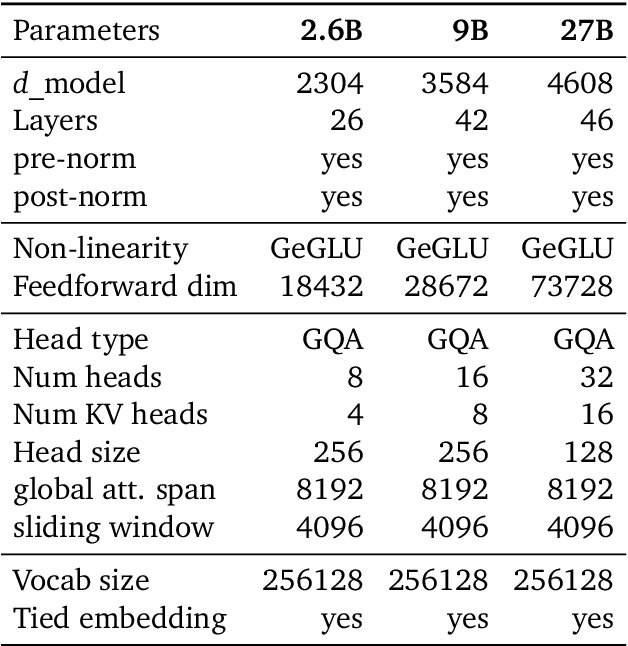
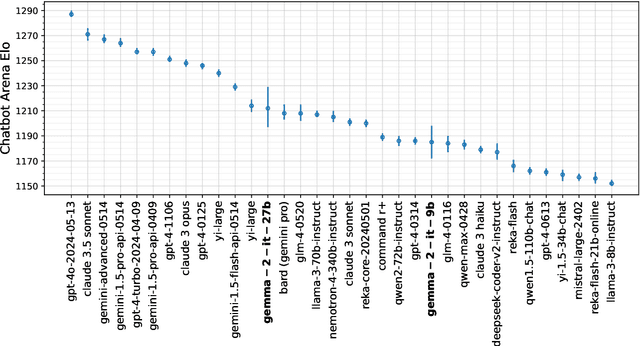
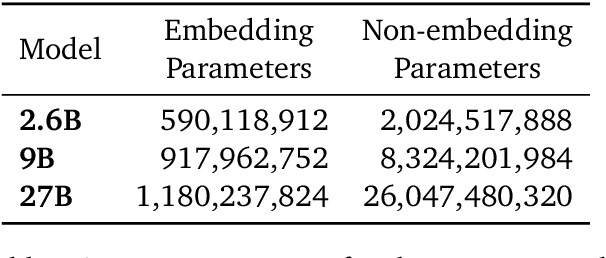
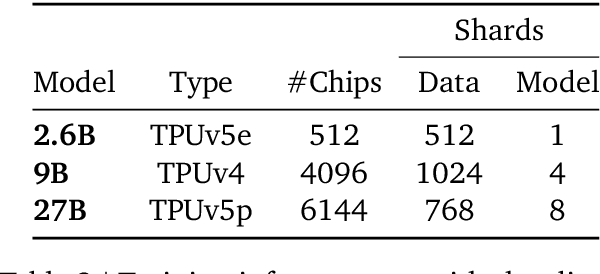
Abstract:In this work, we introduce Gemma 2, a new addition to the Gemma family of lightweight, state-of-the-art open models, ranging in scale from 2 billion to 27 billion parameters. In this new version, we apply several known technical modifications to the Transformer architecture, such as interleaving local-global attentions (Beltagy et al., 2020a) and group-query attention (Ainslie et al., 2023). We also train the 2B and 9B models with knowledge distillation (Hinton et al., 2015) instead of next token prediction. The resulting models deliver the best performance for their size, and even offer competitive alternatives to models that are 2-3 times bigger. We release all our models to the community.
BOND: Aligning LLMs with Best-of-N Distillation
Jul 19, 2024


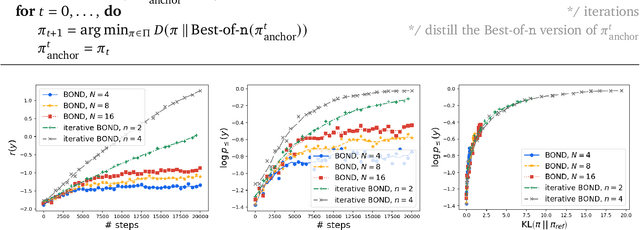
Abstract:Reinforcement learning from human feedback (RLHF) is a key driver of quality and safety in state-of-the-art large language models. Yet, a surprisingly simple and strong inference-time strategy is Best-of-N sampling that selects the best generation among N candidates. In this paper, we propose Best-of-N Distillation (BOND), a novel RLHF algorithm that seeks to emulate Best-of-N but without its significant computational overhead at inference time. Specifically, BOND is a distribution matching algorithm that forces the distribution of generations from the policy to get closer to the Best-of-N distribution. We use the Jeffreys divergence (a linear combination of forward and backward KL) to balance between mode-covering and mode-seeking behavior, and derive an iterative formulation that utilizes a moving anchor for efficiency. We demonstrate the effectiveness of our approach and several design choices through experiments on abstractive summarization and Gemma models. Aligning Gemma policies with BOND outperforms other RLHF algorithms by improving results on several benchmarks.
Gemini: A Family of Highly Capable Multimodal Models
Dec 19, 2023Abstract:This report introduces a new family of multimodal models, Gemini, that exhibit remarkable capabilities across image, audio, video, and text understanding. The Gemini family consists of Ultra, Pro, and Nano sizes, suitable for applications ranging from complex reasoning tasks to on-device memory-constrained use-cases. Evaluation on a broad range of benchmarks shows that our most-capable Gemini Ultra model advances the state of the art in 30 of 32 of these benchmarks - notably being the first model to achieve human-expert performance on the well-studied exam benchmark MMLU, and improving the state of the art in every one of the 20 multimodal benchmarks we examined. We believe that the new capabilities of Gemini models in cross-modal reasoning and language understanding will enable a wide variety of use cases and we discuss our approach toward deploying them responsibly to users.
GKD: Generalized Knowledge Distillation for Auto-regressive Sequence Models
Jun 23, 2023



Abstract:Knowledge distillation is commonly used for compressing neural networks to reduce their inference cost and memory footprint. However, current distillation methods for auto-regressive models, such as generative language models (LMs), suffer from two key issues: (1) distribution mismatch between output sequences during training and the sequences generated by the student during its deployment, and (2) model under-specification, where the student model may not be expressive enough to fit the teacher's distribution. To address these issues, we propose Generalized Knowledge Distillation (GKD). GKD mitigates distribution mismatch by sampling output sequences from the student during training. Furthermore, GKD handles model under-specification by optimizing alternative divergences, such as reverse KL, that focus on generating samples from the student that are likely under the teacher's distribution. We demonstrate that GKD outperforms commonly-used approaches for distilling LLMs on summarization, machine translation, and arithmetic reasoning tasks.
Factually Consistent Summarization via Reinforcement Learning with Textual Entailment Feedback
May 31, 2023



Abstract:Despite the seeming success of contemporary grounded text generation systems, they often tend to generate factually inconsistent text with respect to their input. This phenomenon is emphasized in tasks like summarization, in which the generated summaries should be corroborated by their source article. In this work, we leverage recent progress on textual entailment models to directly address this problem for abstractive summarization systems. We use reinforcement learning with reference-free, textual entailment rewards to optimize for factual consistency and explore the ensuing trade-offs, as improved consistency may come at the cost of less informative or more extractive summaries. Our results, according to both automatic metrics and human evaluation, show that our method considerably improves the faithfulness, salience, and conciseness of the generated summaries.
RLDS: an Ecosystem to Generate, Share and Use Datasets in Reinforcement Learning
Nov 04, 2021



Abstract:We introduce RLDS (Reinforcement Learning Datasets), an ecosystem for recording, replaying, manipulating, annotating and sharing data in the context of Sequential Decision Making (SDM) including Reinforcement Learning (RL), Learning from Demonstrations, Offline RL or Imitation Learning. RLDS enables not only reproducibility of existing research and easy generation of new datasets, but also accelerates novel research. By providing a standard and lossless format of datasets it enables to quickly test new algorithms on a wider range of tasks. The RLDS ecosystem makes it easy to share datasets without any loss of information and to be agnostic to the underlying original format when applying various data processing pipelines to large collections of datasets. Besides, RLDS provides tools for collecting data generated by either synthetic agents or humans, as well as for inspecting and manipulating the collected data. Ultimately, integration with TFDS facilitates the sharing of RL datasets with the research community.
Hyperparameter Selection for Imitation Learning
May 25, 2021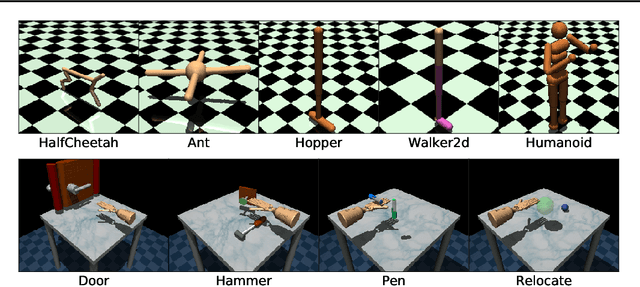
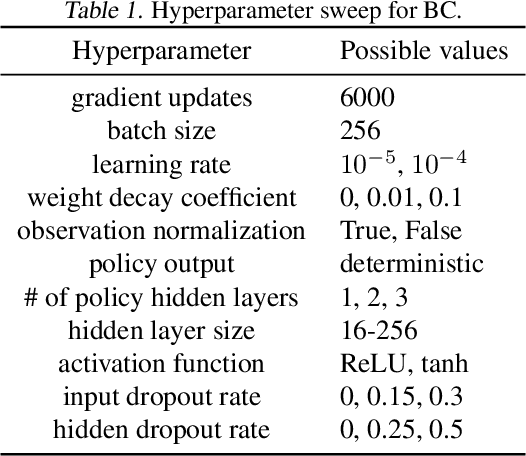
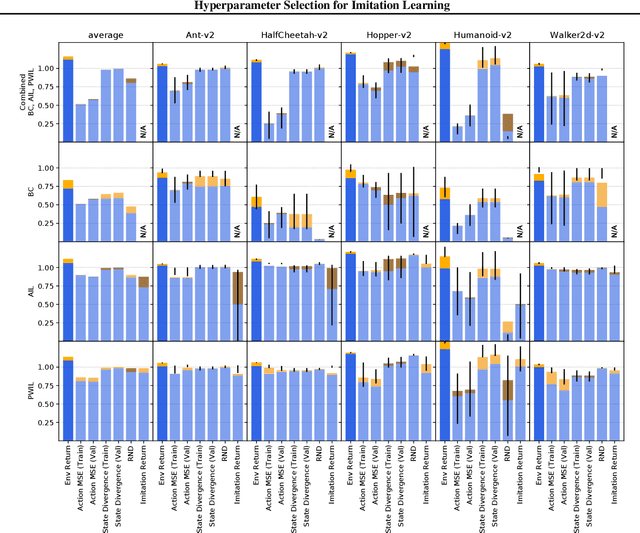
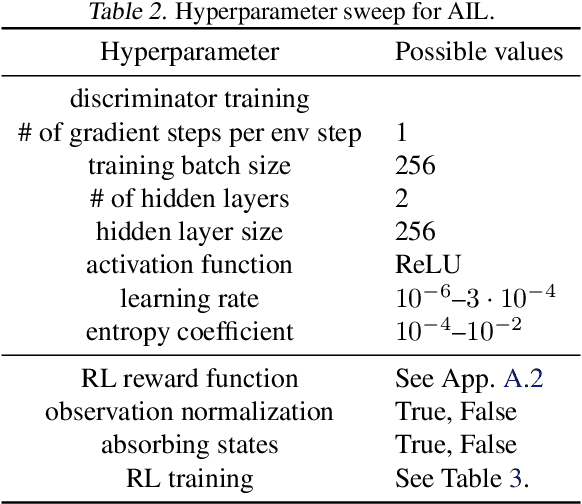
Abstract:We address the issue of tuning hyperparameters (HPs) for imitation learning algorithms in the context of continuous-control, when the underlying reward function of the demonstrating expert cannot be observed at any time. The vast literature in imitation learning mostly considers this reward function to be available for HP selection, but this is not a realistic setting. Indeed, would this reward function be available, it could then directly be used for policy training and imitation would not be necessary. To tackle this mostly ignored problem, we propose a number of possible proxies to the external reward. We evaluate them in an extensive empirical study (more than 10'000 agents across 9 environments) and make practical recommendations for selecting HPs. Our results show that while imitation learning algorithms are sensitive to HP choices, it is often possible to select good enough HPs through a proxy to the reward function.
Reverb: A Framework For Experience Replay
Feb 09, 2021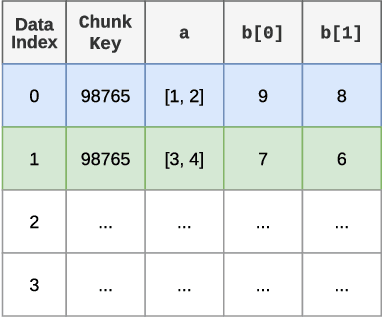
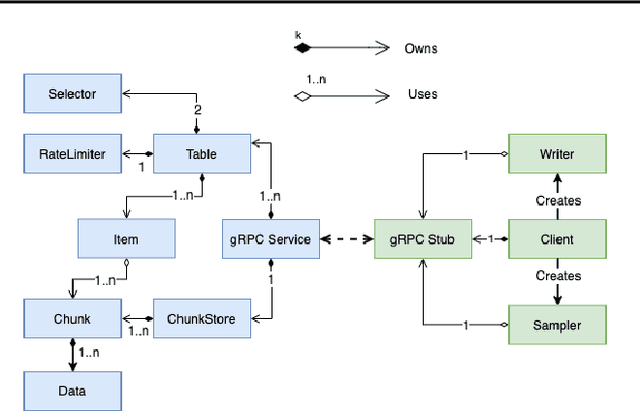
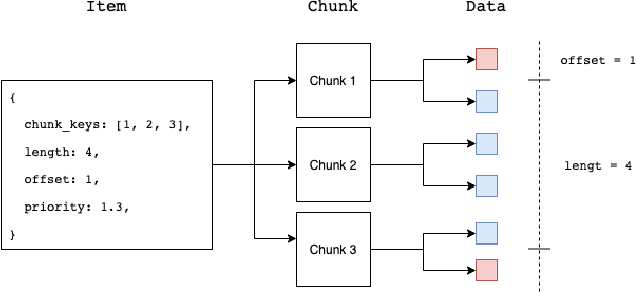
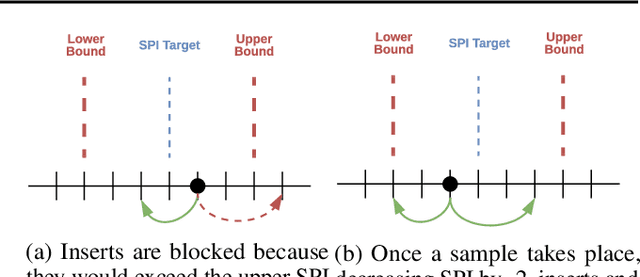
Abstract:A central component of training in Reinforcement Learning (RL) is Experience: the data used for training. The mechanisms used to generate and consume this data have an important effect on the performance of RL algorithms. In this paper, we introduce Reverb: an efficient, extensible, and easy to use system designed specifically for experience replay in RL. Reverb is designed to work efficiently in distributed configurations with up to thousands of concurrent clients. The flexible API provides users with the tools to easily and accurately configure the replay buffer. It includes strategies for selecting and removing elements from the buffer, as well as options for controlling the ratio between sampled and inserted elements. This paper presents the core design of Reverb, gives examples of how it can be applied, and provides empirical results of Reverb's performance characteristics.
 Add to Chrome
Add to Chrome Add to Firefox
Add to Firefox Add to Edge
Add to Edge